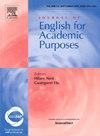Exemplification and reformulation in expert linguists’ writings: Elaborative metadiscourse between disciplinarity and individuality
Abstract
Exemplification and reformulation are key elaborative strategies that empower clarity and argumentation in academic writing. Most research investigating their use in academic writing argues that writers’ choices in terms of frequency and marker type are conditioned by disciplinary variations and the level of expertise of the writers. This has led to an understanding of discourse communities as being homogeneous groups of novice versus expert writers and of separate soft versus hard disciplines. Through the analysis of 90 research articles and book chapters single-authored by six leading linguists, this study shows that these successful authors deviate from the common practices in linguistics and their choices deviate from each other significantly. However, the data does not reveal any steady increasing or decreasing frequencies in the use of exemplification and reformulation throughout their career stages, which makes it hard to claim that the frequency of using the two discourse functions evolves with experience. The study argues that individuality and style preferences within the same discourse community should be acknowledged as an additional variable affecting discursive choices and calls for a more nuanced understanding of disciplinarity and writing expertise.

 求助内容:
求助内容: 应助结果提醒方式:
应助结果提醒方式:


